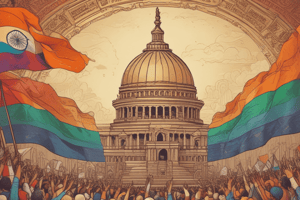Podcast
Questions and Answers
What is the purpose of the Constituent Assembly Debates?
What is the purpose of the Constituent Assembly Debates?
- To discuss the foreign policy implications of the Constitution
- To evaluate the environmental impact of the Constitution
- To interpret the meaning of the Constitution (correct)
- To analyze the economic aspects of the Constitution
How many bulky volumes are printed when the Constituent Assembly Debates are printed?
How many bulky volumes are printed when the Constituent Assembly Debates are printed?
- 8 volumes
- 12 volumes (correct)
- 5 volumes
- 15 volumes
Which major leader's views on the Constitution can help in understanding its overall philosophy?
Which major leader's views on the Constitution can help in understanding its overall philosophy?
- Baldev Singh
- Jawaharlal Nehru (correct)
- Mahatma Gandhi
- Sardar Patel
What is Baldev Singh's role in the Constituent Assembly?
What is Baldev Singh's role in the Constituent Assembly?
What does the preamble to the Indian Constitution do?
What does the preamble to the Indian Constitution do?
Which statement is correct about the members of the Constituent Assembly?
Which statement is correct about the members of the Constituent Assembly?
Who drafted a constitution for India as far back as in 1928?
Who drafted a constitution for India as far back as in 1928?
Which session of Indian National Congress in 1931 focused on the constitution of independent India?
Which session of Indian National Congress in 1931 focused on the constitution of independent India?
What basic values were accepted by all leaders much before the Constituent Assembly met to deliberate on the Constitution?
What basic values were accepted by all leaders much before the Constituent Assembly met to deliberate on the Constitution?
What struggle rejuvenated India and aimed to transform society and politics?
What struggle rejuvenated India and aimed to transform society and politics?
What advantage did the makers of the Indian Constitution have as compared to South Africa?
What advantage did the makers of the Indian Constitution have as compared to South Africa?
Who were committed to including universal adult franchise, right to freedom and equality, and protecting minority rights in the constitution of independent India?
Who were committed to including universal adult franchise, right to freedom and equality, and protecting minority rights in the constitution of independent India?
What is the significance of the Preamble in the Indian Constitution?
What is the significance of the Preamble in the Indian Constitution?
Which principle of the Indian Constitution ensures that citizens cannot be discriminated against based on caste, religion, or gender?
Which principle of the Indian Constitution ensures that citizens cannot be discriminated against based on caste, religion, or gender?
What aspect of the Indian Constitution ensures that wealth should be shared equally by society?
What aspect of the Indian Constitution ensures that wealth should be shared equally by society?
Why is it important that the head of state in India is an elected person and not in a hereditary position?
Why is it important that the head of state in India is an elected person and not in a hereditary position?
In what way does the principle of Secularism in the Indian Constitution provide freedom to its citizens?
In what way does the principle of Secularism in the Indian Constitution provide freedom to its citizens?
What role does the concept of Sovereignty play in the Indian Constitution?
What role does the concept of Sovereignty play in the Indian Constitution?
Study Notes
The Indian Constitution
- The Indian Constitution was drawn up and enacted by the people through their representatives, not handed down by a king or outside powers.
Key Features of the Preamble
- The Preamble is like a poem on democracy, containing the philosophy on which the entire Constitution is built.
- It provides a standard to examine and evaluate any law and action of government, to determine whether it is good or bad.
- The Preamble is the soul of the Indian Constitution.
Sovereign, Socialist, Democratic, and Secular Republic
- The Constitution declares India to be a sovereign, socialist, democratic, and secular republic.
- Sovereign means the people have supreme right to make decisions on internal and external matters, with no external power dictating the government of India.
- Socialist means the government regulates the ownership of land and industry to reduce socio-economic inequalities.
- Democratic means the head of the state is an elected person, not a hereditary position.
- Secular means citizens have complete freedom to follow any religion.
Justice and Liberty
- Justice means citizens cannot be discriminated against on the grounds of caste, religion, and gender, and social inequalities must be reduced.
- The government should work for the welfare of all, especially the disadvantaged groups.
- Liberty means wealth is generated socially and should be shared equally by society, with no unreasonable restrictions on citizens' thoughts and actions.
Constitutional Design
- The makers of the Indian Constitution had an advantage, as they did not have to create a consensus on what a democratic India should look like, as it had evolved during the freedom struggle.
- The national movement was a struggle against foreign rule and to rejuvenate the country, transform society and politics.
- There were sharp differences of opinion within the freedom struggle about the path India should take after Independence, but some basic ideas were accepted by almost everyone.
Makers of the Indian Constitution
- The Constituent Assembly had many members who were not from the Congress, representing different social groups and ideologies.
- Documents from the Constituent Assembly Debates provide the rationale behind every provision of the Constitution and are used to interpret its meaning.
Studying That Suits You
Use AI to generate personalized quizzes and flashcards to suit your learning preferences.
Description
Explore the meaning of key words in the Preamble of the Indian Constitution and understand the philosophy on which the Constitution is built. Delve into the democratic principles encapsulated in the Preamble.





